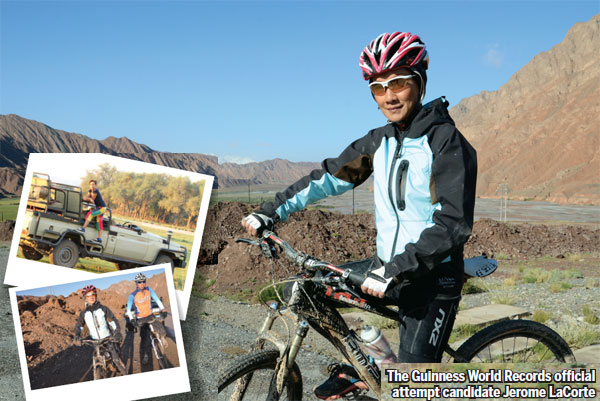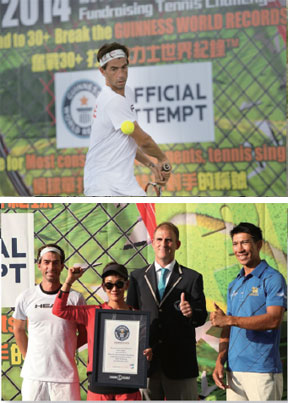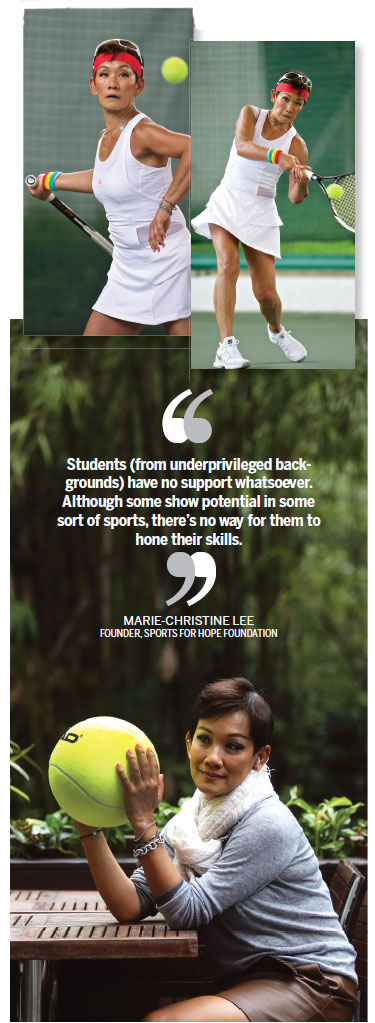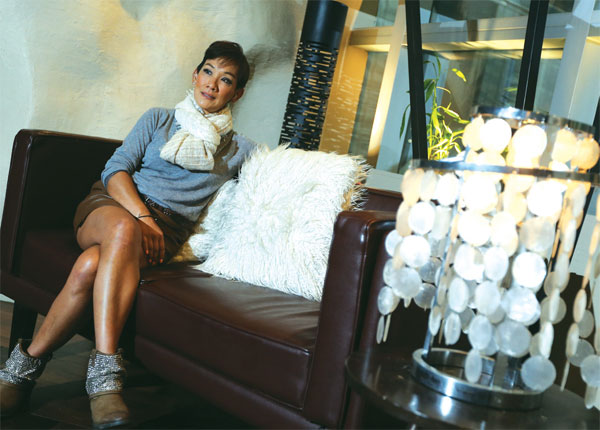An uphill task
Updated: 2014-11-17 07:07
By Ming Yeung(HK Edition)
|
|||||||

She grew amid wealth and privilege, but for Marie-Christine Lee, what she treasures most of all her advantages are the things she learned from participating in sports. This weekend found her pursuing her dream, to share those lessons with kids who never had the chances she had. Ming Yeung writes.
Marie-Christine Lee is no ordinary woman. There she was, back in 2011, in her 40s and a mother of two grown children, pedaling across the Xinjiang Uygur autonomous region at breakneck speed on a mountain bike, along the old Silk Road.
It didn't bother her that she was the only amateur cyclist among her group of four. She had committed much of her life to sports, loved to challenge herself, test her limits.
"On the first day, I had a bit of a headache and difficulty in breathing as we were 2,000 meters above sea level," she recalls. "For an athlete, this was quite a challenge and I had to adjust to it bit by bit."

She had a goal in setting out on this endurance test - to help those less privileged to benefit from participating in athletics. She had begun intensive training three months before the journey. Throughout her life she had acquired the athlete's self-discipline and had learned to dig deep to find the reserves within. Her desire to help the grassroots of society continues to motivate her today.
She founded the Sports for Hope Foundation, and hoped her journey along the Silk Road would raise money to get her foundation started - providing world-class sports training to underprivileged youth.
"Although my family has long sponsored different foundations, those were mainly for the academia and arts. Sports was vastly neglected," she explains.
Lee's father was the late Harold Lee Hsiao-wo, co-founder of Hong Kong Television Broadcast Limited. She grew up a rich kid, with a tennis court and swimming pool in the backyard. "My parents just dropped me in the pool and let me swim. That's how I learned," says Lee. Her laughter sparkles with inexhaustible energy that seems to light up the room and all that surrounds her.
Not one to give up
Anyone who sets out to test her limits confronts the specter of failure. "I never let myself feel remorse and dwell on it. I look for answers, instead," Lee told China Daily. To her, every failure is just another step toward the next accomplishment. She sees athletics and the failures that come with it, as a journey of self-discovery that trains the athlete to get up after she falls down, and, if need be, go back to "Square One".
Sports have nurtured her "never-give-up" mentality, inculcating in her a strong sense of playing fair.
Lee is fully aware that famous schools catering to children of wealth are abundantly subsidized. Students can learn whatever they want. Students from the grassroots rarely get that chance. "They have no support whatsoever. They usually perform poorly in studies and have low self-esteem. Although some show potential in sports, there's no way for them to hone their skills," Lee says.
That was her motivation for setting out on the arduous trek along the Silk Road. The weather was volatile and often bad. Many things could have gone wrong. But in the end everything went right. All the while, her family waited anxiously for news she had safely arrived at her destination.
On the ride, she raised nearly HK$8 million to get her charitable foundation started. That was enough, to sponsor training programs at three schools in the New Territories where most of Hong Kong's underprivileged families live.
Soon after, Lee established links with Sports Legacy, a program that pairs up retired athletes with students who might realize their own dreams in the athletic world.
Today, four schools are beneficiaries of Lee's pilot scheme, which has come under the auspices of the Sports Federation & Olympic Committee of Hong Kong, China.
Changed destinies
"Sports are essential to personal development and serve as a tool to help young people understand the rules of games and build up confidence and a strong mindset, even though they may lose," she adds.
Before joining the scheme, many students knew nothing about self-discipline. Here they are not only taught technical skills but are encouraged to be a responsible person.
The foundation hired former Olympians to coach the potential future athletes. Soon, Lee began to see positive results among the young trainees, in their athletic skills and also in terms of their outlook on life.
There was a cross-border student, a known troublemaker, who commuted daily from Shenzhen to his school in the New Territories. Since he started training to play soccer he has changed. His coach says the boy has excelled on the pitch and is also doing well in his studies.
One rower has been admitted to the Hong Kong Sports Institute, the city's only institute for training elite athletes.
The scheme has proven to be a huge success. "It was not pure luck. It was 100 percent well-planned hard work," Lee says. She plans to submit proposals to the government next year, seeking additional funding to help more underprivileged kids fulfill their sports dreams.
"I have to make sure donors' money is spent appropriately and wisely," she says. She interviewed each scholarship applicant from Chinese University of Hong Kong's Sports Team personally.
Lee insists on putting one's heart into the sport one might wish to pursue. "You have to be really into it. First of all, you have to enjoy doing it and you have to keep persisting."
When her daughter was six, and son about eight, Lee and her husband, William Louey Lai-kuen, went on a family trip to Egypt. The little girl and her brother endured the scorching sun by day, and shivered in the bitter chill of the night winds. A member of the local tribe acted as their guide on sightseeing trips.
"It was definitely the most memorable trip of their lifetime. And it was truly educational. Never underestimate your children," says the proud mother.
Her children are now grown-ups, but Lee is no less occupied, having to juggle organizing fundraising events for her foundation and playing sports at least three days a week.
So how does she manage to pull it all off without breaking into a sweat?
"Wake up early," she winks.
The Silk Road was three years ago and the funding pool has nearly gone dry. To keep the foundation buoyant, she organized a challenge to get into the Guinness World Records. Her tennis coach, Jerome Lacorte, set out to play 33 matches over 32 hours at the Hong Kong Sports Institute in Fo Tan. He pulled it off.
When it was over, an emotional Lacorte commented, "the support I received is something that I will never forget. It is an incredible feeling that comes through sport, and it is something that I am committed to sharing with the youth of Hong Kong and worldwide through the Sports for Hope Foundation."
Among the many luminaries lending their racquets in support was Thai tennis star Paradorn Srichaphan.
Other top-ranked players included Zhang Ling and Philip King, Eliot Teltscher and former Hong Kong number one Tong Ka-po.
A carnival atmosphere prevailed and in a city terribly slow to embrace athletics, many people learned something this weekend. Sports is not just about play - it's also about building character.
Contact the writer at mingyeung@chinadailyhk.com


(HK Edition 11/17/2014 page7)